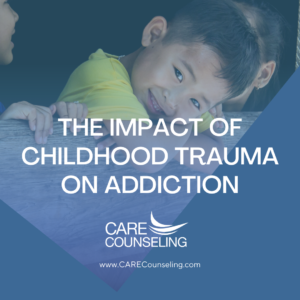The Impact of Childhood Trauma on Addiction
 One of the most profound and challenging consequences of childhood trauma is its link to addiction. In this blog post, we’ll delve into the intricate relationship between childhood trauma and addiction, shedding light on the profound impact that early adversity can have on an individual’s journey toward substance abuse and dependence.
One of the most profound and challenging consequences of childhood trauma is its link to addiction. In this blog post, we’ll delve into the intricate relationship between childhood trauma and addiction, shedding light on the profound impact that early adversity can have on an individual’s journey toward substance abuse and dependence.
The Link Between Childhood Trauma and Addiction
Childhood trauma encompasses various adverse experiences, including physical, emotional, or sexual abuse, neglect, household dysfunction, and more. Research has shown that individuals who have experienced childhood trauma are at a significantly higher risk of developing addiction for several reasons:
- Coping Mechanisms: Trauma survivors often turn to substance use as a coping mechanism to numb emotional pain and distress. Drugs and alcohol can provide temporary relief from overwhelming emotions.
- Self-Medication: Trauma survivors may use substances to self-medicate symptoms of post-traumatic stress disorder (PTSD), depression, anxiety, or other mental health conditions that often result from trauma.
- Alterations in Brain Chemistry: Childhood trauma can alter brain chemistry, making individuals more susceptible to addiction by affecting reward pathways and impulse control.
- Escapism: Substance use may offer an escape from intrusive memories, flashbacks, or nightmares associated with traumatic experiences.
- Reduced Self-Worth: Childhood trauma can lead to low self-esteem and feelings of worthlessness, which can further drive substance abuse as individuals seek to feel better about themselves.
Trauma-Informed Approaches to Addiction Treatment
Understanding the profound impact of childhood trauma on addiction has led to the development of trauma-informed approaches to addiction treatment. These approaches recognize the following principles:
- Safety: Creating a safe and supportive environment is crucial for trauma survivors. This involves physical and emotional safety, including avoiding re-traumatization.
- Trustworthiness and Transparency: Building trust is a cornerstone of trauma-informed care. Transparency in treatment decisions and open communication foster trust between clients and providers.
- Peer Support: Peer support from individuals with lived experience of trauma and addiction can be especially powerful. Peer support specialists understand the unique challenges faced by trauma survivors.
- Collaboration: A collaborative approach involving multidisciplinary teams ensures that individuals receive comprehensive care addressing both their addiction and trauma.
- Empowerment and Choice: Trauma-informed care emphasizes client empowerment and choice in decision-making, allowing individuals to regain a sense of control over their lives.
- Cultural Sensitivity: Recognizing the cultural context of trauma is essential, as different cultures may have unique perspectives on trauma and healing.
- Resilience and Strength: Trauma-informed care focuses on an individual’s strengths and resilience rather than viewing them solely as victims. This promotes a more positive and hopeful outlook on recovery.
- Holistic Healing: Treating the whole person includes addressing mental, emotional, and physical health, as well as social and environmental factors that may contribute to addiction.
Integrating Trauma-Informed Care into Addiction Treatment
- Comprehensive Assessment: A thorough assessment of each client’s history, including any childhood trauma, is essential. This information helps tailor treatment plans to individual needs.
- Specialized Therapies: Evidence-based therapies such as Trauma-Focused Cognitive Behavioral Therapy (TF-CBT) and Eye Movement Desensitization and Reprocessing (EMDR) are effective for trauma survivors.
- Safe Environments: Treatment facilities should prioritize creating safe and welcoming spaces where clients feel secure and respected.
- Supportive Relationships: Building strong therapeutic relationships between clients and healthcare providers fosters trust and a sense of belonging.
- Education and Awareness: Clients benefit from education about the effects of trauma on addiction and the strategies for healing. Understanding the connection can reduce shame and self-blame.
- Self-Care and Coping Skills: Teaching clients healthy coping mechanisms and self-care practices equips them with tools to manage triggers and stressors without turning to substances.
- Relapse Prevention: Trauma-informed relapse prevention strategies help clients recognize and address the underlying emotional triggers that may lead to substance use.
The link between childhood trauma and addiction is undeniable, and its consequences are profound. However, by recognizing the relationship and integrating trauma-informed approaches into addiction treatment, we can provide individuals with a more compassionate and effective path to recovery.



























